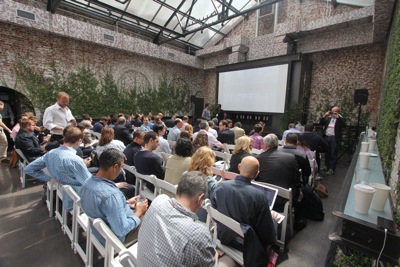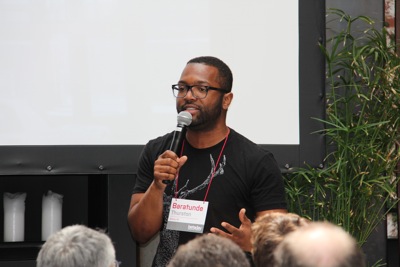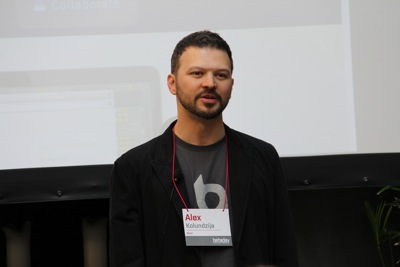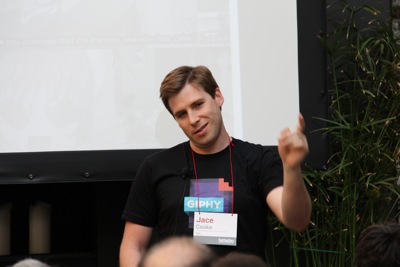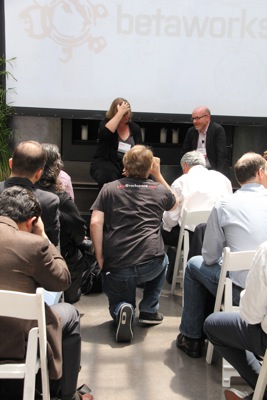UPDATED: Added another possible suggestion to What Can You Do?
Recently, we saw a flurry of discussion surrounding Apple and their new subscription bounty. So many cries of “foul!” and “unfair!” – it was evident that many people had never taken a deep look at platforms, the people behind them, and why they come into being in the first place.
The First Platform
The first platform I can remember was when Google launched their maps API in June 2005. How cool was that! Before Google, maps data was nearly impossible to get hold of, and certainly not in a form that made it easy to access. Maps data was huge; it took a lot of resources to host and to maintain. It was expensive to get hold of – who could cut a deal with a maps provider at early stage? Even big organizations couldn’t justify the cost of getting that data versus the uncertain return it would bring. Maps data took a lot of computation power to fully access; you had to know how to write programs to access maps data efficiently and quickly.
In an ingenious move, Google took their maps data, which powered their own maps product, worked it out with the maps providers contractually, and then released it to the world through an API. This spawned an amazing flurry of innovation, more than they could have achieved internally. They created a maps platform on which others could build and innovate without the added difficulties of getting the maps data at all, and maintaining it.
Not only did this spawn innovation on their own platform, it created a flurry of platforms launched by every company who had data to share, on the hopes that they could get developers to do something interesting with the data they had.
Why Platform?
Now that Google (assuming there wasn’t another company that did it before Google) paved the way, people had proof that this was a great thing to do and could justify positive effects worthy of their time and cost.
Google showed that companies can open up their data to the outside for the following reasons:
1. They have some valuable proprietary data that nobody else has.
2. They want to extend the value of their data by leveraging outside resources.
3. They want to innovate on that data and want to utilize the creativity of the external developers to do that.
4. They want innovation but can’t do it internally for any one or more of reasons we all could come up with, with respect to big organizations and even small.
5. They want to create another monetization stream, now that Google and others have shown that this is possible.
6. If someone innovates in a way that is hugely profitable and brings an enormous amount of customers and value to the company, that opens up the possibility of bringing that capability into the company either through acquisition or blatant copying.
7. By the way, all this has positive effects on the customers and users of the original platform as they can enhance their experience with the activity via the new innovation that arises.
This is, of course, dependent on the company actually having resources to:
1. Do the development and make the platform available for outside consumption.
2. Create a backend to support the platform and be able to support enough access to it to support a large ecosystem of developers.
3. Create a monetization scheme around the platform.
4. Set up on-going support and maintenance of the platform. Continuing support is necessary to make sure that platform access is not interrupted or corrupted.
5. Setup educational resources to teach people how to develop for the platform.
Opportunity Beckons!
The announcement of a platform comes usually with lots of excitement and interest.
Wow! Data that was previously hard to get hold of, now easy!
Developers can innovate and make money! They put together pitch decks and get funded by investors!
Even the company benefits from the press, who covers this explosion of developer studliness and the emergence of a new ecosystem and rampant innovation.
Eventually, as developers get on the platform, the company makes money by charging for access to the platform. If the company is smart, it would have planned for many avenues of monetization. In many instances, many cannot be planned for. Herein, lies the dangers of developing for platforms…
Dangers of Platforms
While opportunity knocks for both developers and the company, people start forgetting about a crucial concept, which is the most often misunderstood or forgotten concept about platforms:
A company creates a platform solely for its own benefit first, before all else.
I cannot think of any company that just puts a platform out there for the good of the world, and is willing to just pay the bills for providing this service without monetizing anyone using it. Wikipedia seems to be getting an API together so I suppose they are the closest to an independent organization that claims to be non-profit. NYC opened its data to the world and held a competition to see who could create the best applications using that data.
But other than non-profits like Wikipedia and government organizations, for-profit companies create platforms to increase usage, to open up new opportunities, to draw customers, to make more money. Otherwise, how can they justify to their shareholders, budgets, and balance sheets to keep personnel dedicated to developing and supporting the platform?
While a platform may be launched with its services being used for free, at some point this must change. A platform’s owner will eventually, if not at the outset, begin to charge for being on that platform. It will start exerting control through techniques like throttling of data (pay to get full speed and volume access), taking a cut of all money made by anyone on the system, and up to kicking developers who have growing influence and power off the system using a variety of techniques.
All of these facts make it extremely dangerous for any developer to depend solely on a single platform for its livelihood. It’s because you never know when the platform will turn on you. So if you’re going to create a business on someone else’s platform:
Never bank your business on a single platform.
Why is that? It’s because the world has shown that as long as you are small and not a threat to a platform, the platform will let you live on it. The moment you get big, powerful, hugely profitable, and/or influential, the platform will begin to actively work to stifle you up and to the point of shutting you down.
Let’s take a look at what was once one of the most opportunistic platforms: Facebook. Here is a snapshot of a series of events through the history of its apps platform. As you flow through this peek at its history, remember also this essential fact about Facebook which is their relentless focus on the user and keeping users happy:
May 24, 2007
Facebook Launches Facebook Platform; They are the Anti-MySpace
“Facebook’s strategy is almost the polar opposite from MySpace. While MySpace frets over third party widgets, alternatively shutting them down or acquiring them, Facebook is now opening up its core functions to all outside developers.”
After Facebook launches its platform, developers quickly figure out that continuous posting throughout friend’s walls, both legitimate and not, could grow their services enormously by exposing new potential customers to their services. Many grew to tremendous size on these marketing techniques.
Aug 16, 2007
Facebook Takes Action Against “Black Hat” Apps
“The changes that Facebook have made today, while they may inconvenience some application developers, have clearly been done to protect users from spammy tactics that some applications have employed.”
Jul 7, 2008
Facebook Continues War On App Developers. This Week: Super Wall
“Facebook is continuing its war on Facebook apps that push the limits on acceptable user interaction. Last week it was Slide’s Top Friends App, which it briefly suspended. Later Facebook also suspended another popular app, Social Me.
This time they’re targeting Slide’s rival RockYou and their Super Wall application, which tends to have a lot of spammy user content. But instead of shutting down the application wholesale, they’ve simply turned off the viral components of the app – invitations, notifications, etc.
The consequences have been just as dramatic. A month ago Super Wall had 2.4 million average daily users. Today it’s 600,000 and falling fast.”
Those whose services were dependent on a continuous firehose of users and not on their own merits to grow users saw their traffic shut off and many were forced to shut down. But some did figure out how to keep growing within the system, generate huge profits, and then use those profits to further market to users on Facebook via their advertising platform. Enter Zynga.
Oct 31, 2009
Scamville: The Social Gaming Ecosystem Of Hell
“Zynga may be spending $50 million a year on Facebook advertising alone, fueled partially by lead gen scams. Wonder how Facebook got to profitability way ahead of schedule? It was a surge in this kind of advertising. The money looks clean – it’s from Zynga, Playfish, Playdom and others. But a large portion of it is coming from users who’ve been tricked into one scam or another.”
This time also saw the entrance of a clever promotional method pioneered by a company named Trialpay and others like Offerpal, which enticed users to sign up for an advertiser’s service and traded that user signup for credits which could be used in the games. It drove a ton of revenue into the social games running on Facebook and encouraged users to keep signing up for these services in order to get essentially free credits in the games to gain levels and buy virtual goods.
Sep 17, 2010
Social Gaming Market Reaches Its Final Stage…and It’s Not Looking Pretty
“This same cycle is now taking place in social media. When Facebook changed the rules, the early leaders in the space faced two extremely unpleasant realities: 1) Unlike casual gaming, their popular franchises were ineffective at acquiring Facebook audience directly and 2) Paying market rates for audience made their books look a whole lot less pretty. Faced with this challenging circumstance, social game development studios have started taking aggressive steps to remedy their situations, including:
- Finding buyers as fast as possible before people realize that their growth and maybe even their businesses are not sustainable
- Leveraging the abundant capital available to try to buy their way out of dependence on Facebook by either acquiring their own standing audiences or by acquiring non-Facebook dependant game companies
- Overspending on marketing to try to buy audiences to preserve their apparent growth even as their books leak money and their earned audiences decline”
By now, Facebook’s changes and restrictions were growing to point that many companies simply could not survive and were forced to shut down or take other options. If they have enough capital, they attempt a pivot off the platform. If not, they were dead.
Jan 24, 2011
Facebook To Make ‘Facebook Credits’ Mandatory For Game Developers (Confirmed)
“Facebook has confirmed that it is indeed making Facebook Credits mandatory for Games, with the rule going into effect on July 1 2011. Facebook says that Credits will be the exclusive way for users to get their ‘real money’ into a game, but developers are still allowed to keep their own in-game currencies (FarmBucks, FishPoints, whatever). For example, Zynga can charge you 90 Facebook Credits for 75 CityCash in CityVille.”
“Of course, Facebook gets something out of it: they take an industry-standard 30% cut whenever users purchase anything with Facebook Credits. That can add up to a lot of money — we’ve heard elsewhere that Zynga is paying Facebook around $30 million a month for its Credits tax.”
Facebook launched their own virtual currency which they are requiring any developer on their apps platform to use. Direct charging of customers is prohibited, and Facebook receives a 30% cut of all monetary transactions on their system.
What’s a Facebook dependent company to do? Zynga was a lucky one. They were grew so huge that they *could* take their users and leave.
May 7, 2010
Zynga Gunning Up (And Lawyering Up) For War Against Facebook With Zynga Live
In fact, after Facebook began to force Zynga to use their credits, they threatened to leave. They formed Farmville.com and started making motions that it was going to leave and take its audience with them. But, it was also to Facebook’s advantage to keep Zynga on their platform as they were generating an enormous amount of revenue for Facebook. So after a lengthy negotiation, Zynga still remains on the platform, to the delight of users who love to play Zynga games on Facebook, but also paying a significant amount of capital to Facebook, although we do not know the details of how much.
May 18, 2010
Facebook And Zynga Enter Into Five Year Partnership, Expand Use Of Facebook Credits
So far, only Zynga has had enough market power to initiate that kind of negotiation. Every other company has been forced to change their strategy or die.
Will it Happen Again?
There are a lot of platforms and their APIs: older ones like Google, newer ones like Twitter and Foursquare.
You could say that Google search is a platform. Over the years, people have used SEO to drive traffic to their sites. It’s a never ending game to figure out how to get yourself on the top of search results for important terms. Google adjusts the algorithm for best user relevance; companies game the system to get higher up, sometimes being relevant and sometimes to fool users into clicking over in order to monetize them. Even now, companies are in danger of being dependent on Google.
Demand Is Strong For Demand Media IPO
“It’s important to note that Google is changing how it ranks certain websites, including Demand’s network of content. Demand is highly dependent on Google search traffic and no doubt a change in ranking could negatively effect the content farm’s business.”
If Demand Media is to be a true contender in the public markets, it cannot be beholden to another company for its success. It needs to be independent or else it risks being shut down. The markets know this and the short sellers are loading up on Demand Media stock. As of Feb 28, there are 3.21M shorts on DMD, up from 2.68M from the previous month.
Twitter’s Platform
Look at a small piece of history of Twitter’s platform:
September 20, 2006
Twitter Blog: Introducing the Twitter API
Dec 9, 2009
Twitter Spawned 50,000 Apps To Date, Will Open Up Firehose For More
Apr 9, 2010
Twitter Acquires Tweetie
“Unsurprising, because Twitter investor Fred Wilson recently wrote that Twitter developers needed to stop “filling holes” in Twitter’s product and instead build entirely separate businesses.”
When Twitter acquired a mobile app, it put all other mobile Twitter apps in danger. But let’s look at someone who is trying build a business on real-time Twitter data and attempt to monetize it in a way that other Twitter apps have not, to this date: UberMedia.
Why Is Twitter So Afraid Of This Man?
The world suspects that Bill Gross is attempting to aggregate Twitter clients and find a way to monetize the users, which has, to date, eluded Twitter itself.
As a result:
Feb 18, 2011
Twitter Suspends UberMedia Clients For Privacy And Monetization Violations, Trademark Infringement
While I am only hypothesizing here, and the news say that Twitter shut down UberMedia due to policy violations, I am sure that somewhere in Twitter, somebody has noted the growing power of UberMedia and has drawn battle lines in the sand. To me, it was only a matter of time.
And at SXSW:
March 11, 2011
Twitter Drops The Ecosystem Hammer: Don’t Try To Compete With Us On Clients, Focus On Data And Verticals
It becomes official; Twitter clients are Twitter’s responsibility.
And Apple’s iOS…?
So why would Apple’s strategy around iOS be any different, when it comes to exerting control over its developers over time?
The Harsh Realities
1. The launch of a platform can present large opportunities, especially if the platform owner has chosen not to innovate for whatever reason.
2. Small to medium businesses can be built on this platform and the platform allow them to thrive.
3. Over time and as the platform gains users and power, the platform will continue to press its advantage in monetization.
4. If there are any businesses that gain significant influence or power, the platform will seek to limit their influence and power through any number of techniques. This can be any kind of limits in access to the data, to driving more monetization from them, to blatant shut down.
5. As a business owner who is trying to build a business in this kind of environment, it can really suck. You will feel like the world is crashing down around you and are powerless to do anything about it. Feeling powerless and watching all your hard work go down the tubes really sucks. I can sympathize. In my portfolio, the machinations of platforms has already tanked two of my businesses. I’ve learned to not invest in startups who are overly dependent on a single platform.
What Can You Do?
1. Don’t plan on building a business that is dependent on a single platform. Plan early for a business strategy that can be ported to other platforms (ie. a mobile app business that is built on iOS, Android, and Blackberry; ad serving that is on webpages, mobile apps, etc.).
2. You can start by developing for a single platform to gain traction. But move as fast as possible to be not dependent on that single platform.
3. If you’re skilled and/or lucky, you should attempt to build your business as fast and as large possible on the platform. If you can grow your influence and power to the platform, you may be able to have negotiating leverage against the platform in case they attempt to shut you down. Do this before the platform figures out that they should do something about you.
4. If you can, you should build something that is essential to the platform’s customers. This puts the customers on your side in case the platform tries to shut you down.
5. Plan for independence. Can your customers/users be taken with you if you are forced to leave the platform? If so, this makes you less dependent on the platform. Build towards this independence as fast as possible.
6. Build something that continues to add tremendous value to the platform, and hopefully that value is measured in dollars. This has proven to be a way to be exempt from getting shutdown by the platform. An example of a business built on a platform that have been left alone are SEM management companies who are helping Google generate tons of revenue, but their own revenue is independent of gets passed to Google. As long as they do not interfere with Google’s monetization, they really don’t care about how they monetize over and above the rates that Google sets.
7. Leverage PR to your advantage. Write blog posts, talk to journalists about how a platform has destroyed your livelihood. Bad press can be a lever used against a platform’s owner who cares about their reputation in the world.
8. Analyze the terms of service before you start. Make sure you aren’t violating or are close to violating their TOS. Even entering grey areas can put you at risk for shutting down.
9. Don’t develop an improved version of a core service. Just because the original platform owner doesn’t do something basic well, doesn’t mean that they won’t do it better later and supplant you, or shut you down. It may mean that you get acquired (ie. Tweetie), but if there are a lot of competitors, then this can be a single-winner-everyone-else-loses-it-all game.
10. [NEW] Be super-creative and develop a service that is a huge opportunity but also something that the platform owner would never want to do themselves. Then the platform will be most likely to leave you alone (assuming you don’t do something like violate their policies). An example of this is Zynga on the Facebook platform. Facebook will never want to be a games developer, so they will probably never try to do this themselves. However, if you’re great at games development, you can create a big business as Zynga has done. If the platform owner ever wants to enter the space that you’re in, then you’re most likely going to die.
The struggle between the platform’s constituents (users/customers, businesses on the platform, and the platform itself) is a classic fight for market balance. You provide something of value, you find out what people are willing to pay for it, you constantly test how much you can charge for something and adjust to what you think the market will bear. If there is anything you don’t like, then just leave, assuming there is somewhere to go. If there is nowhere to go to, then the platform has all the advantage. But usually there are competitors and a platform has to also work hard to keep customers and businesses on its ecosystem or else they will leave.


